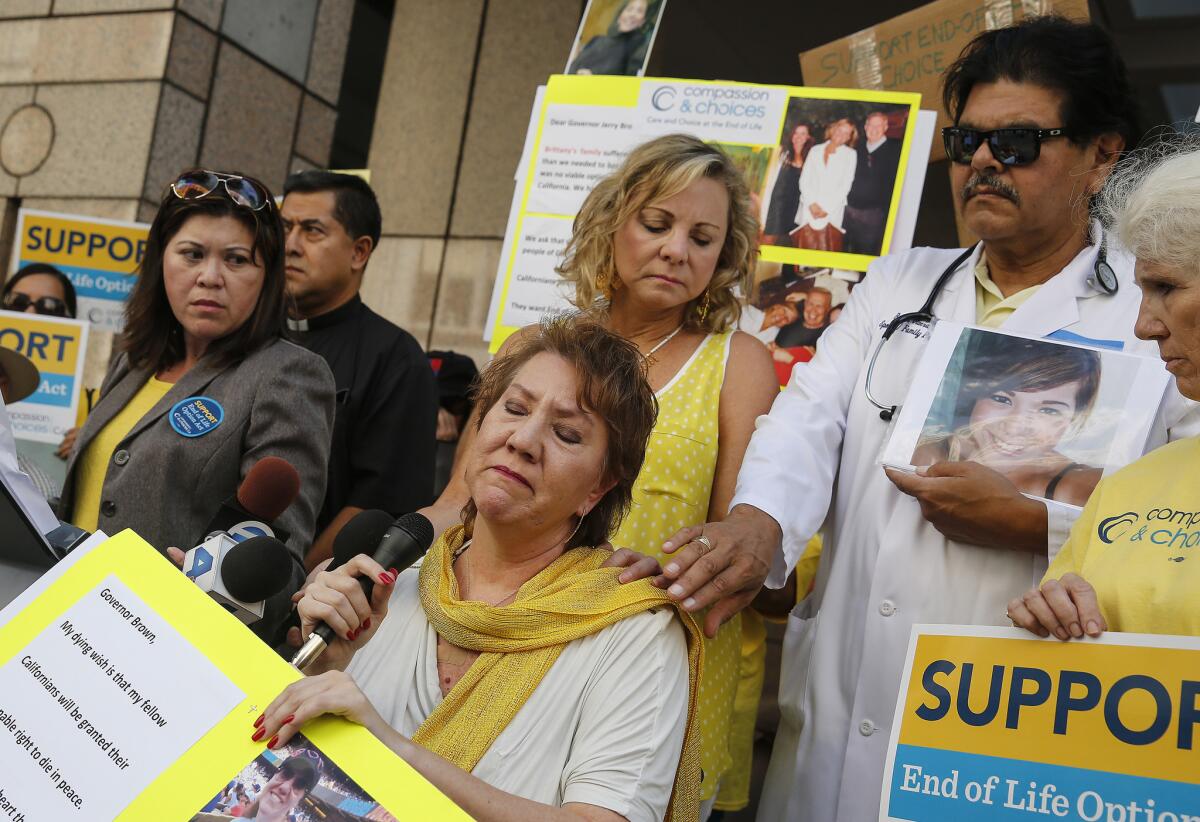Aid-in-dying law to take effect June 9 in California

Former Los Angeles Police Officer Christy O’Donnell, who has since died of a terminal illness, is pictured center with scarf at a September rally for the End of Life Option Act, which will take effect June 9.
- Share via
Reporting from Sacramento — California’s terminally ill patients should begin talking to physicians now if they want to end their lives, advocates said Thursday after a legislative vote triggered a June 9 start date for the End of Life Option Act.
The law, which allows doctors in California to prescribe lethal doses of drugs to terminally ill people who want to hasten their deaths, includes a time-consuming approval process that could take several weeks, said Toni Broaddus, California campaign director for the group Compassion & Choices.
Gov. Jerry Brown signed the measure last year, but it wasn’t until the Legislature adjourned a special session in Sacramento on Thursday that June 9 was set for when it becomes legal for physicians to write lethal doses without fear of criminal prosecution.
Join the conversation on Facebook >>
Broaddus said doctors can begin explaining options and considering requests.
“We are telling people to start talking to their doctor now,” said Broaddus, whose group, formerly known as the Hemlock Society, helped pushed the bill to approval and has launched a bilingual education campaign on how to participate.
Sen. Bill Monning (D-Carmel), a co-author of the law, predicted discussions will begin before June 9 as patients make sure their doctors are up to speed on the law and physicians explain all options, including those not involving the Act, such as hospice care.
“I certainly expect it’s going to provoke conversations within families and between terminally ill patients and physicians,” Monning said.
Senate leader Kevin de Leon (D-Los Angeles) said on the Senate floor just before the adjournment vote Thursday that the law “ensures Californians have access to humane and compassionate options to limit suffering at the end of life.”
The bill had failed to win needed support during the regular session, so supporters introduced it in special session, allowing it to bypass committees where opposition was strong.
The approval of the law through “controversial legislative tactics” was denounced again Thursday by Tim Rosales of Californians Against Assisted Suicide.
See the most-read stories this hour >>
The group “remains strongly critical of this new law, and its lack of medical oversight and actual patient safeguards,” he said. “We will continue working with our partners, including doctors, patients and disability rights organizations, to educate those impacted and vulnerable, as well as working to limit the law’s harms and prevent any expansion.”
California will be one of a half-dozen states to allow physicians to prescribe lethal doses to the terminally ill.
The California Medical Assn. published guidelines on the law in January that spell out the requirements for terminally ill patients diagnosed with less than six months to live. The patients must make two verbal requests at least 15 days apart and one written request that is signed, dated and witnessed by two adults. Patients must also fill out forms that were included in the legislation.
The process can be further delayed if the physician suspects mental illness requiring an evaluation by a mental health professional.
Even if some terminally ill patients begin the process now, Broaddus said she does not expect a large number of deaths on June 9. In Oregon, which previously adopted the same law, patients on average wait 45 days to take the lethal doses from the time they are prescribed.
The delays are often the result of patients wanting the doses in hand just in case but waiting until the last possible moment to take the medication, Broaddus said.
The California Medical Assn., which was neutral on the law, does not have a recommendation on whether patients and doctors should begin discussions now, according to spokeswoman Molly Weedn. “It’s up to those doctors and their patients and the individual situations” to determine what is best for their course of care, she said.
Twitter: @mcgreevy99
ALSO:
Adjournment triggers law’s start date
California’s new laws: See how you’re affected
More to Read
Get the L.A. Times Politics newsletter
Deeply reported insights into legislation, politics and policy from Sacramento, Washington and beyond. In your inbox twice per week.
You may occasionally receive promotional content from the Los Angeles Times.










